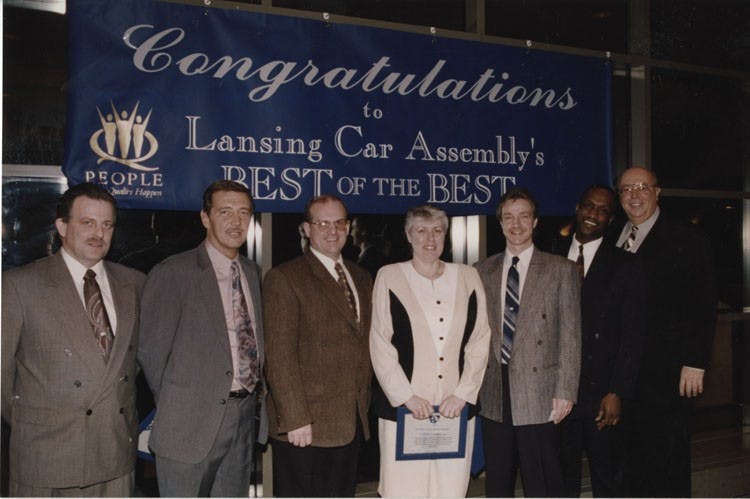The website's layout is a throwback to the days where Yahoo was a dominant search engine and everyone's email ended "@hotmail.com". Some of the audio files were originally held on cassette tapes. The subject matter is even older, reaching to Lansing auto workers' experiences as far back as the 1920s.
However antiquated the Lansing Auto Town gallery might seem, this offshoot of MSU's G. Robert Vincent Voice Library remains a relevant testament to Lansing's storied car history.
John Shaw, supervisor of the Voice Library, said a significant portion of the collection came about as a result of other collection efforts, like a General Motors work program and "The Story of REO Joe," a book on Lansing's now-defunct REO Motor Car Company. MSU's role was to catalog and digitize the material, making it accessible to the public.
The thing the recordings all have in common, Shaw said, is that you can hear explicitly how life and layoffs in the auto manufacturing field affected real Lansing residents, not just executives or a company's bottom line.
“It is Lansing people talking about working here,” Shaw said. “Generally, things that are saved tend to be recordings of people who are more famous, more powerful. ... It’s also important for oral histories to have the folks that were the backbone of industry.”
One of these people was not only a "backbone of industry," but a backbone of the success of the entire project. Kevin Beard currently works in the Voice Library, converting thousands of hours of analog recordings into a more permanent digital format.
Before taking his position in the Voice Library - and before serving as a city councilman - Beard was a General Motors employee. Towards the end of his employment there, he was tasked with keeping other GM workers busy as they remained on the payroll while the company shut down its Verlinden Avenue plant.
As he and fellow union workers navigated these "idled" employees through education and community service efforts, the idea to produce an oral history of Lansing auto workers was born.
"One of the guys I was teamed up with, Lyle Birchman, stood there and looked across this room where we had about 300 [idled GM workers] sitting," Beard said. "And he says, 'you know, just think about all the history that's sitting out there. It's too bad we can't collect it.' Well, I knew somebody that could help us."
That somebody was John Beck, a professor in labor relations - the same field Beard was pursuing his master's degree in.
"[Beck's] the lynchpin," library associate director Shawn Nicholson said. "He's the key to all of this. The fact that he's on campus, is a library supporter and understander of what libraries do ... without that, this project doesn't happen."
Beck had connections to organizations like the Michigan Oral History Association, who did the exact work Birchman had in mind. After being trained on interviewing techniques, employees were sent out and spoke with their colleagues for a series of peer-to-peer interviews before returning to work for GM.
"[GM workers] spent their work day collecting these interviews," Beard said. "They went out and interviewed over about the next year - the team kinda got whittled down as they were called back to work - in a year they interviewed 152 people and made 126 recordings."
Brian Yopp, director of programs at MotorCities National Heritage Area, says the gallery is distinguished by the stories of minorities, like women - who sometimes had to walk across entire buildings just to find a bathroom - and black and Latino workers who faced racism and discrimination on the factory floor. He thinks these perspectives provide useful context for the true story of Lansing’s automotive scene, something that motivated his organization to help fund the Auto Town gallery.
Support student media!
Please consider donating to The State News and help fund the future of journalism.
“It was important to capture that information,” Yopp said. “Now people, as generations go on, can go back and understand the experience of the workers, of different races, of different ethnicities and backgrounds, the female perspective, things like that. ... It adds a lot of fabric to the typical narrative about workers in plants.”
One drawback of the gallery's online format: it's difficult to truly measure its impact. Auto Town hasn't exactly broken the internet; as of October 13, it's received a modest 22,907 total page views since its launch in 2011. Clicks themselves don't necessarily mean people care about the material, a fact that made Nicholson's grant-writing efforts more difficult.
"With a project like this, what I wrote into the grant was we would keep track of server logs and some of those download activities," Nicholson said. "That's just a proxy for the use. But do we really know [the gallery's impact] without any anecdotal information? No."
This proved to be a minor hiccup in the bigger picture. Convincing federal agencies to fund the gallery was otherwise a no-brainer. Given the historical importance of Michigan's auto industry and Oldsmobile, REO and General Motors' strong local ties, Nicholson said federal agencies were "predisposed" to funding a car-related history project at MSU.
The project is nominally active, but because it relies so much on first-hand experiences and the efforts of auto workers, it’s been difficult to get major additions. The General Motors interviews came about because the company idled the Verlinden workers instead of laying them off, the interviewing work was paid instead of volunteer-based, and Kevin Beard was able to provide a uniquely direct GM-MSU link. That's a perfect storm that's highly unlikely to happen again.
"There's some level of serendipity in here," Beard said.
Discussion
Share and discuss “Auto Town gallery preserves Lansing's storied automotive past” on social media.







